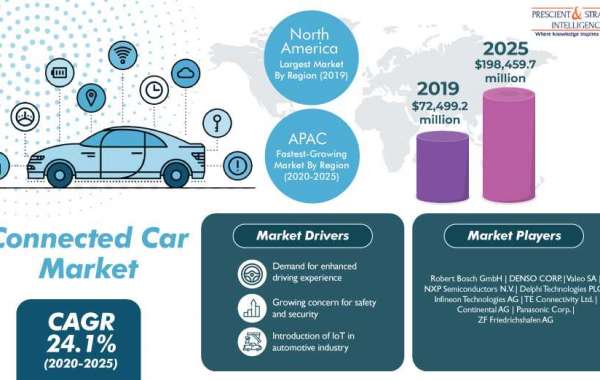Governments across the world are raising concerns over vehicle and passenger safety and automobile data security, owing to which automobile manufacturers are integrating advanced technologies, such as automatic braking, lane assist, and advanced driver assistance systems (ADAS), in their offerings. For instance, the National Highway Traffic Safety Administration (NHTSA) has administered the Motor Vehicle Safety Act to promulgate safety standards for retrofitting commercial motor vehicles and equipment, in the U.S. Similarly, the European Union (EU) mandates the integration of lane-keeping assistance, intelligent speed assistance, black box, and advanced emergency braking systems in cars in Europe.
Thus, the surging public and government concerns on vehicle safety will help the connected car market progress at a vigorous CAGR, of 24.1%, during 2020–2025. The market was valued at $72,499.2 million in 2019 and it is projected to generate $198,459.7 million revenue by 2025. Moreover, the increasing integration of artificial intelligence (AI) and internet of things (IoT) technologies in automobiles is also fueling the adoption of connected cars, worldwide. The installation of AI and IoT solutions in vehicles has transformed the face of mobility by allowing automobile manufacturers to achieve better connectivity in these vehicles.
According to P&S Intelligence, North America led the connected car market in the preceding years, due to the increasing public demand for advanced technologies in passenger cars in the region. Connected cars are equipped with smartphone connectivity, roadside assistance, traffic and collision warning, automobile diagnostics, and real-time traffic update features. The surging preference for such cars can also be attributed to the increasing implementation of vehicle safety policies, which mandate the inclusion of advanced driving technologies in automobiles.
Whereas, the Asia-Pacific (APAC) region is projected to adopt connected cars at the highest rate in the foreseeable future, owing to the surging need for the installation of connected devices in passenger cars and the soaring popularity of digital services, such as cybersecurity and software updates, in the region. Additionally, the rising number of strategic alliances between automobile and non-automobile companies for meeting the government regulations for vehicle data security and developing an improved communication infrastructure will also steer the shift toward connected cars in APAC in coming years.
Thus, the soaring public and government concerns on vehicle safety and the rising public awareness on improved driving experience will augment the adoption of connected cars.







